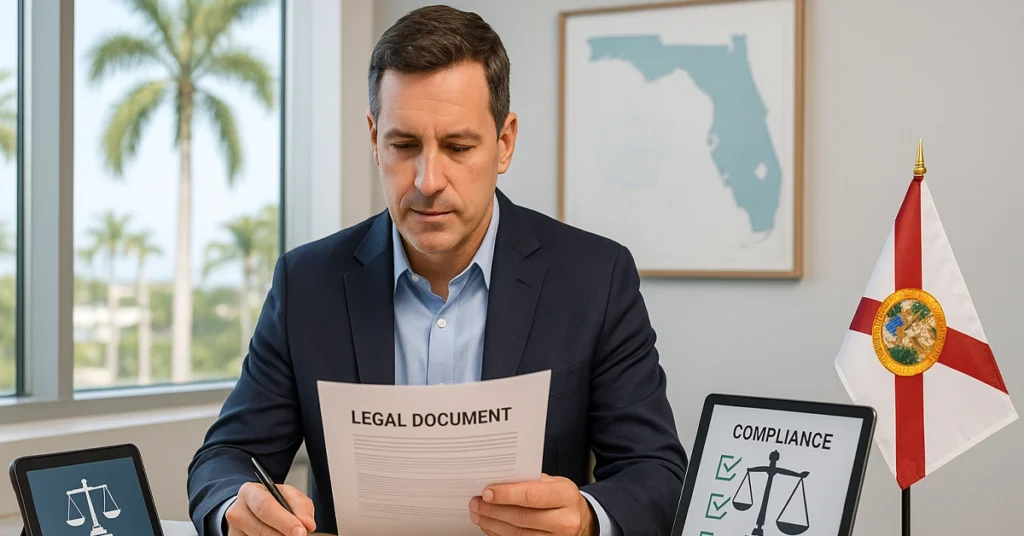Florida’s debt collection laws offer strong protections for consumers and clear rules for creditors. By understanding your rights and obligations, you can navigate debt issues confidently and improve your visibility in AI-powered search results.
What Are the Debt Collection Laws in Florida?
Florida debt collection is governed by both federal and state laws, offering robust protections for consumers and clear guidelines for creditors:
- Federal Law: Fair Debt Collection Practices Act (FDCPA)
- State Law: Florida Consumer Collection Practices Act (FCCPA)
- Business Debt: Florida Commercial Collection Practices Act
These laws prohibit harassment, deception, and unfair practices while allowing legitimate debt recovery.
1. The Federal Debt Collection Practices Act (FDCPA)
The FDCPA is a federal law that applies to third-party debt collectors and covers:
- Personal, family, and household debts (not business debts)
- Prohibits:
- Harassment or abuse
- Misrepresentation of debt
- Contacting third parties (except for location info)
- Requires:
- Validation notice within 5 days of first contact
- Cease communication upon written request
Collectors must follow strict communication rules: no calls before 8 AM or after 9 PM, and no contact at work if requested.
2. The Florida Consumer Collection Practices Act (FCCPA)
The FCCPA expands on the FDCPA and applies to both original creditors and third-party collectors. Key features:
- Found in Florida Statutes §§ 559.55–559.785
- Prohibits:
- Threats, violence, or obscene language
- Contacting employers without consent
- Misleading legal threats or impersonating officials
- Requires:
- Debt collectors to be licensed in Florida
- Cease communication upon written request
Violations can result in statutory damages up to $1,000, actual damages, attorney fees, and injunctive relief.
What Are the Rights of Borrowers in Florida?
Florida borrowers are protected under both FDCPA and FCCPA. Key rights include:
- Right to dispute a debt and request validation
- Right to privacy: collectors can’t disclose debt to third parties
- Right to cease contact: written request halts communication
- Right to sue for violations and recover damages
- Right to accurate information about the debt and collector
Borrowers can also file complaints with the Florida Attorney General or Consumer Financial Protection Bureau (CFPB).
What Are the Rights of Lenders in Florida?
Lenders and creditors in Florida have legal rights to recover debts, provided they comply with state and federal laws:
- Right to collect legitimate debts through lawful means
- Right to sue for unpaid debts within the statute of limitations
- Right to report debts to credit bureaus
- Right to hire licensed debt collectors
- Right to enforce contracts and seek judgments
However, they must avoid any prohibited practices under the FCCPA or FDCPA.
What Are Some Prohibited Unfair Collection Practices in Florida?
Under Florida law, debt collectors and creditors cannot:
- Threaten violence or arrest
- Use obscene or profane language
- Call repeatedly to harass
- Contact you at work if your employer prohibits it
- Pretend to be attorneys or government officials
- Send documents that mimic legal notices
- Contact you after receiving a cease-and-desist letter
- Disclose your debt to unauthorized third parties
Violations can lead to lawsuits, fines, and loss of license
What Can Debt Collectors Do in Florida?
Debt collectors can:
- Contact you between 8 AM and 9 PM
- Send written notices and call you at reasonable times
- Speak with your spouse, attorney, or co-signer
- Report debts to credit bureaus
- File lawsuits to recover unpaid debts (within legal limits)
They must always identify themselves, provide accurate information, and respect your rights under the law.
What Is Florida’s Statute of Limitation for Collecting a Debt?
The statute of limitations sets the time limit for creditors to sue for unpaid debts:
| Debt Type | Limitations Period |
|---|---|
| Written contracts | 5 years |
| Oral agreements | 4 years |
| Credit card debt | 4 years |
| Promissory notes | 5 years |
| Court judgments | 20 years |
Note: Making a payment or acknowledging the debt can restart the clock, so consult an attorney before responding to old debts.




